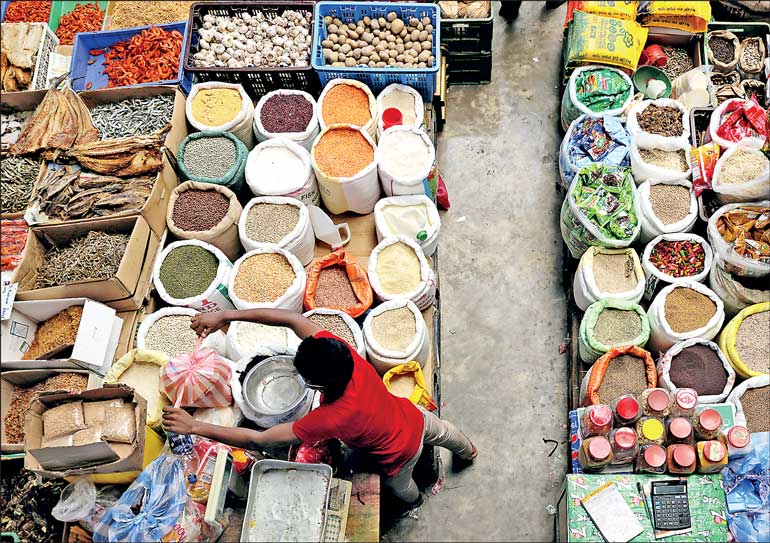Saturday Feb 14, 2026
Saturday Feb 14, 2026
Thursday, 22 September 2022 00:10 - - {{hitsCtrl.values.hits}}

From the sharp rise in food insecurity to the daily suffering of many people, the ruling class in Sri Lanka has failed
 The intensification of the economic crisis in Sri Lanka in 2022 has no exact parallel in history. While it may be compared to moments such as the Great Depression of the 1930s or the global economic downturn of the 1970s, these analogies are only guides. In each case, a particular element may offer an example of continuity while another might reveal discontinuity. Depending on the critical way in which we think through them, these historical situations can offer useful signposts. But the point that we must also consider is that there is no readymade solution that can be found in the past.
The intensification of the economic crisis in Sri Lanka in 2022 has no exact parallel in history. While it may be compared to moments such as the Great Depression of the 1930s or the global economic downturn of the 1970s, these analogies are only guides. In each case, a particular element may offer an example of continuity while another might reveal discontinuity. Depending on the critical way in which we think through them, these historical situations can offer useful signposts. But the point that we must also consider is that there is no readymade solution that can be found in the past.
The same logic applies when comparing Sri Lanka with other countries. Each one that has experienced sovereign default in the recent past, from Argentina to Greece, has followed its own trajectory. In addition to the different positions of these countries within the global economy as compared to Sri Lanka, the timing of their episodes of default has also been critical. Sri Lanka’s crisis is occurring at a moment during which the global hegemonic order is under tremendous strain. Solutions such as austerity that may have been workable in the past, despite deepening social inequality, are unlikely to be acceptable to the wider public now.
If we focus, then, on what is new in the current moment, we can start from two premises. The first is that, unlike the Great Depression of the 1930s, capitalism does not face multiple competing systemic alternatives, from communism to fascism, that force it to adapt. Despite the ongoing pressures of inter-imperialist rivalry and the potential for decoupling, so far there is not as much structural pressure to reconsider the fundamental economic model. The second difference is that the current global moment offers the prospect of a long economic downturn, including slowing growth and rising costs, without the revolutionary political forces that are capable of constraining powerful states.
If we take these two issues seriously, we can nevertheless start to sketch what a meaningful response to the dramatic economic collapse in Sri Lanka could look like. To broach this debate, we must ask critical questions. First, why does Sri Lanka’s ruling class actively resist negotiating better terms with powerful external actors, such as the International Monetary Fund (IMF)? Or why, in general, is it unable to find the intellectual and creative resources to solve the country’s problems? Second, what is the collective agency that can push instead for an acceptable solution?
The need for change and its mechanism
Answering the first question is relatively straightforward. The elite may have its own economic interests that are in many ways undermined by an approach focused on austerity, such as the sudden float of the rupee earlier this year, the big hike in interest rates, or even the ongoing collapse in domestic demand. But in many ways the narrow character of the debate about economic solutions hinges on the fact that the ruling class has failed to cultivate an independent group of traditional intellectuals capable of offering real solutions to its problems.
More than mere economic dependency, it is the intellectual dependency on the conservative guild of professional economists that shapes the mental outlook of the ruling class. The political economist Susan Strange referred to it as the “international sympathies” between mainstream economists, regardless of whether they are from creditor or debtor countries. The fact that Sri Lanka’s economic establishment, for example, attempts to restrict the debate to the narrow, technical parameters of an IMF bailout mechanism—the first step on the same failed path to chasing mythical foreign investment and re-entering international capital markets—is a clear sign of its intellectual bankruptcy.
In contrast, the second question is more challenging. Historically, the political left was split on whether the owners of industrial manufacturing capital—the bourgeoisie—was the leading edge of economic development. Perhaps the clearest example in the local debate were the different conclusions drawn by “old left” intellectuals such as Hector Abhayavardhana and Edmund Samarakkody on whether Sri Lanka ever had a national, as opposed to comprador, bourgeoisie. Regardless, both factions were confident that the ultimate alternative existed in the rise of the proletariat, or working class, that would become further concentrated in industrial centres.
In contrast, in the context of the recent uprising of 9 July in Sri Lanka and the subsequent repression, the mass social opposition to authoritarian regimes that has emerged is far more amorphous. It is difficult to categorise in terms of a single class. Nevertheless, the value in referring to this opposition as an expression of the more flexible category of working people’s politics is that it enables us to grasp possibilities for envisioning a new order. This does not mean that working people are a coherent class that evolves like the proletariat. But it does mean that given the stakes of the current moment, the struggles of working people to secure their livelihoods demarcate new zones of experimentation in which their needs can become the focal point of policy.
The challenge right now is that the left must continue to raise this debate in the broader society and force open the question of alternatives. Despite the ongoing repression, the current reaction led by Ranil Wickremesinghe has not been able to create a stable equilibrium, meaning one that can reproduce the existing order into the indefinite future. Accordingly, politics will continue to work itself out until an appropriate solution is found. In this decisive moment, it is critical to put forward ideas that can support efforts to stimulate organising, which is also critical to the mass mobilisation required for Sri Lanka to recover from the economic collapse.
But the urgency of the task further requires accepting the discomforting realisation that there is no easy solution without experimentation. To forge ahead in creating an egalitarian framework for resolving the crisis means acknowledging that there is no mechanical guarantee of progress, whether in the forward march of the bourgeoisie or proletariat. From the sharp rise in food insecurity to the daily suffering of many people, the ruling class in Sri Lanka has failed. What replaces its leadership of society, however, is a much more open-ended question. Any effective politics first and foremost requires clarifying the values that can become an active element in producing a critical social consciousness, and ultimately the basis for a revolutionary subjectivity capable of transforming the social order.
The state and the social order
To this extent, there are subtle signs of a shift in the discourse during this ongoing period of political uncertainty. People may be becoming aware that privatisation is not a panacea, especially as left parties from the JVP to the FSP slowly start to bring these arguments into clearer public view, in addition to asserting a different order of collective priorities. But there is still much more to be done in constructing an alternative theory of the state. As I have mentioned in previous columns, we need to go beyond the rhetoric of corruption to develop a positive understanding of state capacity. This requires acknowledging the role of working people’s politics in setting clear goals for the state and circumscribing its mode of intervention. That includes undermining rent-seeking by instilling a mission-oriented sensibility.
Rather than saying the state is good or bad, we must look behind the mirror and identify ways of transforming the decaying social order that it attempts to reproduce. The question remains why the state is not doing more to solve the food crisis, for example, including rapidly channelling investment into appropriate areas and creating a new system of incentives in which other social organisations, such as cooperatives, can gain market leverage. The focus of the debate needs to shift from the abstract level of debate about austerity versus deficit spending in general, to identifying the concrete ways in which immediate public investment can solve bottlenecks in supply chains that are the cause of rising prices.
The bigger point is that the state operates in a much wider terrain of conflicting social forces. Given the depth of the crisis, even a state capitalist alternative will not be enough to pull Sri Lanka out of the crisis. Instead, only a dramatic reconfiguration of social relations in an egalitarian direction will be able to overcome this difficult period. This idea is difficult to think in the abstract. It will depend as much on the initiative and activities of voluntary organisations that have sprung up. But it also has to do with perennial questions such as land redistribution, along with disciplining capital and repurposing existing production to meet the immediate needs of domestic consumption.
Meanwhile, we may acknowledge that the ruling class has failed and must be replaced in terms of its hegemonic leadership of society. But the reality is that the system will continue to create opportunities for private accumulation so long as capitalism exists on a global level. In this sense, the ruling class may continue to function within a new progressive order, but in a far more restricted and narrowly economic way. If the ruling class has failed to create a group of intellectuals capable of solving its problems, then it is up to the wider sections of society to cultivate a new mode of hegemonic thinking that can revive society. The crisis in Sri Lanka may not anticipate the revolution that implies the ultimate transcendence of capitalism. But breaking with neoliberalism could still be a revolutionary act.
Working people’s politics has up to now been defined as much in opposition to this project, whether in terms of demands for subsidising the cost of essential goods or defending existing public institutions such as free healthcare and education. But its ultimate success will hinge on the positive ability of organisations and actors that can mediate the gap between the crisis and its solution. This may not necessarily mean revolutionary overthrow conducted by a vanguard. Instead, it requires the creation of representative institutional spaces in which the public can demand collective solutions to their problems. In this sense, opposing political repression and resolving the economic crisis go hand in hand.